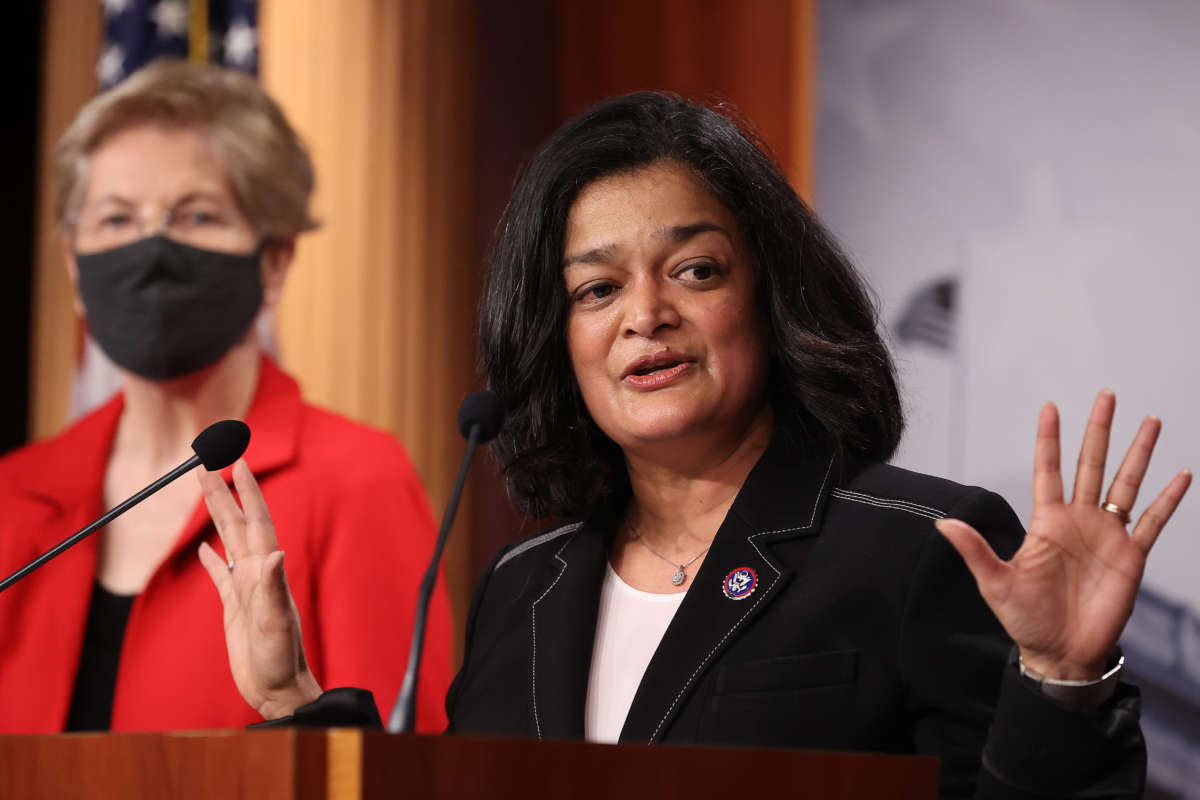Honest, paywall-free news is rare. Please support our boldly independent journalism with a donation of any size.
The leadership of the Congressional Progressive Caucus is calling for permanent repeal of a notorious 2010 law that is threatening to inflict deep, automatic cuts to Medicare and other safety net programs following passage of the $1.9 trillion American Rescue Plan earlier this month.
On Friday, the House of Representatives — with the support of just 29 Republicans — approved legislation that would exempt the coronavirus relief package from a law known as statutory Paygo, which requires deficit spending to be offset by cuts to government programs. The Statutory Pay-As-You-Go Act was enacted in 2010 with the support of the then-Democratic Congress and former President Barack Obama.
While Paygo rules were waived in coronavirus relief bills approved during the Trump presidency, congressional Democrats’ use of the arcane budget reconciliation process to pass the American Rescue Plan over unified Republican obstruction prevented inclusion of a waiver this time around, setting the stage for tens of billions of dollars in cuts to Medicare, farm subsidies, and other programs if the Senate fails to act.
“We’re pleased that the House voted today to waive statutory Paygo for the American Rescue Plan Act to prevent damaging, self-defeating, and wholly unnecessary cuts to Medicare and other programs,” Rep. Pramila Jayapal (D-Wash.), chair of the Congressional Progressive Caucus, said in a statement. “We urge the Senate to follow the House’s lead and act swiftly to waive statutory Paygo.”
But Jayapal stressed that the House bill — which also pushes off a separate 2% cut to Medicare set for April 1 — is just a temporary solution to a problem that will continue cropping up without complete repeal of the 2010 law.
“It’s long past time for Congress to end statutory Paygo permanently,” said Jayapal. “The austerity politics of the last several decades have been an unmitigated failure — hollowing out programs that families rely on and leaving millions unable to afford the basics.”
“Congress should never have to choose between protecting programs like Medicare and lifting families out of poverty or providing urgently needed assistance to working people facing unprecedented economic hardship,” the Washington Democrat continued. “At the Progressive Caucus, we will keep fighting to end statutory Paygo for good so that Congress can focus on what really matters: empowering and investing in working people across this nation.”
While HR 1868 addresses the immediate problem, statutory PAYGO will keep standing in the way of legislation that matches the scale of our national crises.
Congress must permanently repeal statutory PAYGO or completely overhaul it. #PAYGOmustGO https://t.co/fTIX1WJdFw
— Progressive Caucus Action Fund (@WeAct4progress) March 18, 2021
To pass the House legislation, the Senate Democratic caucus will need to win the support of at least 10 Republicans as long as the 60-vote legislative filibuster remains intact. But judging by overwhelming opposition to the Paygo waiver bill among House Republicans — 127 members of the GOP caucus voted no — Senate Democrats could have difficulty obtaining the necessary votes.
A spokesperson for Sen. Bernie Sanders (I-Vt.), chair of the Senate Budget Committee, told NBC News last month that the Vermont senator will work to prevent the estimated $36 billion in Medicare cuts from taking effect. A fix must be passed by the end of the year.
“Trump and his Republican colleagues used deficit spending to pass $2 trillion in tax breaks overwhelmingly benefiting the wealthiest and large corporations and expanding a military budget with a Pentagon that has never been independently audited,” then-Sanders spokesperson Keane Bhatt said in February. “When it comes to feeding children who are hungry or treating people who are sick in the middle of a pandemic, funding cuts due to supposed concerns over the deficit would be unacceptable and immoral.”
Rep. John Yarmuth (D-Ky.), chair of the House Budget Committee, noted Friday that Paygo exemptions have in the recent past “been enacted with little dispute,” pointing specifically to the 2017 bipartisan passage of a waiver for Trump and the GOP’s tax cuts, which could have triggered $25 billion in automatic Medicare cuts.
“Enough House and Senate Democrats joined Republicans to prevent harmful across-the-board cuts to critical programs even though we opposed the short-term [government funding resolution in which the Paygo waiver was buried] and the massive tax giveaways to the wealthy,” Yarmuth said on the House floor.
“Even in the wake of contentious legislation,” the Kentucky Democrat continued, “Congress has come together to prevent sequestration and protect Medicare, farm supports, social services, resources for students and individuals with disabilities, and other programs Americans rely on. This time should be no different.”
A terrifying moment. We appeal for your support.
In the last weeks, we have witnessed an authoritarian assault on communities in Minnesota and across the nation.
The need for truthful, grassroots reporting is urgent at this cataclysmic historical moment. Yet, Trump-aligned billionaires and other allies have taken over many legacy media outlets — the culmination of a decades-long campaign to place control of the narrative into the hands of the political right.
We refuse to let Trump’s blatant propaganda machine go unchecked. Untethered to corporate ownership or advertisers, Truthout remains fearless in our reporting and our determination to use journalism as a tool for justice.
But we need your help just to fund our basic expenses. Over 80 percent of Truthout’s funding comes from small individual donations from our community of readers, and over a third of our total budget is supported by recurring monthly donors.
Truthout has launched a fundraiser to add 340 new monthly donors in the next 5 days. Whether you can make a small monthly donation or a larger one-time gift, Truthout only works with your support.
